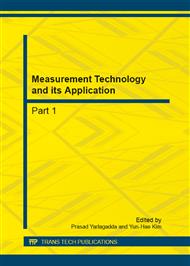[1]
U.S. National Library of Medicine. "About the National Library of Medicine" [DB/OL].[2011-7-19]. http://www.nlm.nih.gov/about/index. html.
Google Scholar
[2]
U.S. National Library of Medicine. "PubMed home". [DB/OL].[2011-7-19]. http://www.ncbi.nlm.nih.gov/pubmed/.
Google Scholar
[3]
U.S. National Library of Medicine. "Medical Subject Headings (MeSH®)".[DB/OL].[2011-7-19]. http://www.nlm.nih.gov/pubs/fact sheets/mesh.html.
Google Scholar
[4]
D. Watts, S. Strogatz, Collective Dynamics of Small World Networks, Nature, 1998, 363: 202-204.
Google Scholar
[5]
J. Kennedy, R. C. Eberhart, and Y. Shi, Swarm Intelligence.San Francisco: Morgan Kaufmann, CA, 2001.
Google Scholar
[6]
Russel C. Eberhart, Yuhui Shi, Particle Swarm Optimization: Developments, Applications and Resources, 81-86.
Google Scholar
[7]
M.A. Abido, Optimal design of power-system stabilizers using particle swarm optimization. IEEE transactions on energy conversion, vol 17, no 3, september 2002. 406-413
DOI: 10.1109/tec.2002.801992
Google Scholar
[8]
Zwe-Lee Gaing, A Particle swarm optimization approach for optimum design of PID controller in AVR system. IEEE transactions on enerty conversion, vol 19, no 2, june 2004. 384-391
DOI: 10.1109/tec.2003.821821
Google Scholar
[9]
Carlos A. Coello Coello, Gregorio Toscano Pulido and Maximino Salazar Lechuga, Handing multiple objects with particle swarm optimization, IEEE Transactions on evolutionary computation, vol 8, no 3, june 2004, 256-279.
DOI: 10.1109/tevc.2004.826067
Google Scholar
[10]
Jinn-Tsong Tsai, Tung-Kuan Liu and Jyh-Horng Chou, Hybrid Taguchi-genetic algorithm for global numberical optimization. IEEE transactions on evolutionary computation, vol 8 no 4 august 2004, 365-377.
DOI: 10.1109/tie.2006.874280
Google Scholar
[11]
Cezary Z. Janikow, A knowledge-intensive genetic algorithm for supervised learnging. Maching learning, 1993, 189-228.
Google Scholar
[12]
Francois spitz, Crole Herkenne, Michael A Morris and Denis Duboute, Inversion-induced disruption of the Hoxd cluster leads to the partition of regulatory landscapes. Nature Genetics volume 37, number 8, august 2005, 889-893
DOI: 10.1038/ng1597
Google Scholar
[13]
F. Murtagh, A survey of recent advances in hierarchical clustering algorithms. The computer journal, vol 26, no 4, 1983, 354-359
DOI: 10.1093/comjnl/26.4.354
Google Scholar
[14]
S. Mancoridis, B.S. Mitchell, Y.Chen and E.R. Gansner, Bunch: A clustering tool for the recovery and maintenance of software system structures.
DOI: 10.1109/icsm.1999.792498
Google Scholar
[15]
Yizhou Sun, Yintao Yu and Jiawei Han, Ranking-based clustering of heterogeneous information networks with star network schema. KDD 2009, 797-805.
Google Scholar
[16]
Ron Bekkerman, Ran El-Yaniv and Andrew McCallum, Multi-way distributional clustering via pairwise interactions. Proceedings of the 22th International conference on Machine Learning, 2005, 41-48.
DOI: 10.1145/1102351.1102357
Google Scholar
[17]
U.S. National Library of Medicine. "FTP Directory" [DB/OL].[2011-7-19]. ftp://ftp.nlm.nih.gov/nlmdata.
Google Scholar


